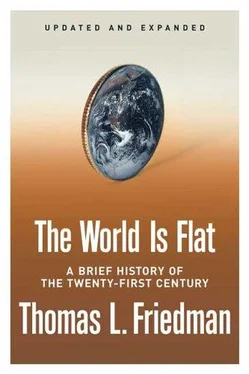Dov Seidman runs LRN, a business that provides online legal, compliance, and ethics education to employees of global companies and helps executives and board members manage corporate governance responsibilities. We were having lunch in the fall of 2004 when Seidman casually mentioned that he had recently signed an outsourcing contract with the Indian consulting firm MindTree.
“Why are you cutting costs?” I asked him.
“I am outsourcing to win, not to save money,” Seidman answered. “Go to our Web site. I currently have over thirty job openings, and these are knowledge jobs. We're expanding. We're hiring. I am adding people and creating new processes.”
Seidman's experience is what most outsourcing is actually about— companies outsourcing to acquire knowledge talent to grow their business faster, not simply to cut costs and cut back. Seidman's company is a leader in one of those completely new industries that just appeared in the flat world-helping multinationals foster an ethical corporate culture around an employee base spread all over the world. Although LRN is a BE company-founded ten years before Enron exploded-demand for its services surged in the PE era-post-Enron. In the wake of the collapse of Enron and other corporate governance scandals, a lot more companies became interested in what LRN was offering-online programs for companies to forge common expectations and understandings of their legal and ethical responsibilities, from the boardroom to the factory floor. When companies sign up with LRN, their employees are given an online education, including tests that cover everything from your company's code of conduct to when you are allowed to accept a gift to what you need to think about before hitting Send on an e-mail to what constitutes a bribe of a foreign official.
As the whole issue of corporate governance began to mushroom in the early 2000s, Seidman realized that his customers, much like E*Trade, would need a more integrated platform. While it was great that he was educating their employees with one online curriculum and advising boards on ethics issues with another, he knew that company executives would want a one-stop Web-based interface where they could get a handle on all the governance and ethics issues facing their organizations— whether it was employee education, the reporting of any anomalous behavior, stewardship of a hard-earned corporate reputation, or government compliance-and where they could get immediate visibility into where their company stood.
So Seidman faced a double challenge. He needed to do two things at once: keep growing his market share in the online compliance education industry, and design a whole new integrated platform for the companies he was already working with, one that would require a real technological leap. It was when faced with this challenge that he decided to enlist MindTree, the Indian consulting firm, in an outsourced relationship that offered him about five well-qualified software engineers for the price of one in America.
“Look,” said Seidman, “when things are on sale, you tend to buy more. MindTree offered a sale not on last season's closeout, but on top-notch software engineering talent that I would have been hard-pressed to find elsewhere. I needed to spend a lot of money defending and extending my core business and continue to take care of my customers, who were working off my current programs. And at the same time, I had to make a giant leap to offer my customers what they were asking for next, which was a much more robust and total online solution to all their ethics, governance, and compliance questions. If I don't meet their needs, someone else will. Partnering with MindTree allows me to basically have two teams-one team [mostly Americans] that is focused on defending and extending our core business, and the other team, including our Indian consultants, focused on making our next strategic leap to grow our business.”
Since ethics is at the core of Seidman's Los Angeles-headquartered business, how he went about outsourcing was as important as the ultimate results of the relationship. Rather than announcing the MindTree partnership as a done deal, Seidman conducted an all-hands town hall meeting of his 170 or so employees to discuss the outsourcing he had in mind. He laid out all the economic arguments, let his staff weigh in, and gave everyone a picture of which jobs would be needed in the future and how people could prepare themselves to fit in. “I needed to show my company that this is what it would take to win,” he said.
Have no doubt, there are firms that do and will outsource good jobs just to save money and disperse it to shareholders or management. To think that is not happening or will not happen is beyond naive. But firms that are using outsourcing primarily as a tool to cut costs, not enhance innovation and speed growth, are the minority, not the majority-and I would not want to own stock in any of them. The best companies are finding ways to leverage the best of what is in India with the best of what is in North Dakota with the best of what is in Los Angeles. In that sense, the word “outsourcing” should really be retired. The applicable word is really “sourcing.” That is what the flat world both enables and demands, and the companies that do sourcing right end up with bigger market shares and more employees everywhere-not smaller and fewer.
“This is about trying to get bigger faster, about how we make our next leap in less time with greater assurance of success,” said Seidman of his decision to source critical areas of development of his new platform to MindTree. “It is not about cutting corners. We have over two hundred clients all over the world now. If I can grow this company the way that I want to, I will be able to hire even more people in all our current offices, promote even more people, and give our current employees even more opportunities and more rewarding career paths-because LRN's agenda is going to be broader, more complex and more global... We are in a very competitive space. This [decision to use outsourcing] is all about playing offense, not defense. I am trying to run up the score before it's run up on me.”
Rule #7: Outsourcing isn't just for Benedict Arnolds. It's also for idealists.
One of the newest figures to emerge on the world stage in recent years is the social entrepreneur. This is usually someone who burns with desire to make a positive social impact on the world, but believes that the best way of doing it is, as the saying goes, not by giving poor people a fish and feeding them for a day, but by teaching them to fish, in hopes of feeding them for a lifetime. I have come to know several social entrepreneurs in recent years, and most combine a business school brain with a social worker's heart. The triple convergence and the flattening of the world have been a godsend for them. Those who get it and are adapting to it have begun launching some very innovative projects.
One of my favorites is Jeremy Hockenstein, a young man who first followed a time-honored path of studying at Harvard and going to work for the McKinsey consulting firm, but then, with a colleague from McKinsey, veered totally off course and decided to start a not-for-profit data-entry firm that does outsourced data entry for American companies in one of the least hospitable business environments in the world, post-Pol Pot Cambodia.
Only in a flat world!
In February 2001, Hockenstein and some colleagues from McKinsey decided to go to Phnom Penh, half on vacation and half on a scouting mission for some social entrepreneurship. They were surprised to find a city salted with Internet cafes and schools for learning English-but with no jobs, or at best limited jobs, for those who graduated.
“We decided we would leverage our connections in North America to try to bridge the gap and create some income-generating opportunities for people,” Hockenstein said. That summer, after another trip funded by themselves, Hockenstein and his colleagues opened Digital Divide Data, with a plan to start a small operation in Phnom Penh that would do data entry-hiring locals to type into computers printed materials that companies in the United States wanted in digitized form, so that it could be stored on databases and retrieved and searched on computers. The material would be scanned in the United States and the files transmitted over the Internet. Their first move was to hire two local Cambodian managers. Hockenstein's partner from McKinsey, Jaeson Rosenfeld, went to New Delhi and knocked on the doors of Indian data-entry companies to see if he could find one -just one-that would take on his two Cambodian managers as trainees. Nine of the Indian companies slammed their doors. The last thing they wanted was even lower-cost competition emerging in Cambodia. But a generous Hindu soul agreed, and Hockenstein got his managers trained. They then hired their first twenty data-entry operators, many of whom were Cambodian war refugees, and bought twenty computers and an Internet line that cost them $100 a month. The project was financed with $25,000 of their own money and a $25,000 grant from a Silicon Valley foundation. They opened for business in July 2001, and their first work assignment was for the Harvard Crimson, Harvard's undergraduate daily newspaper.
Читать дальше












